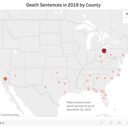By DAVID LANE
Denver Post
The Supreme Court has just agreed to hear a case that will have a significant impact on the death penalty in Colorado. The case will address the issue of whether judges or juries are the appropriate bodies to find facts that could result in the death penalty. Under Colorado law, a jury finds facts leading up to a conviction for first-degree murder. In order to impose the death penalty, additional facts must be found by three judges or the sentence is automatically life without possibility of parole.
If the Supreme Court decides, as I believe it will, that only juries can constitutionally find these facts, the Colorado three-judge panel will be discarded, and once again, Colorado will be without a death penalty, sparing the lives of at least three current death row inmates.
As repugnant as the death penalty is to a civilized society, the atrocity in Colorado is compounded by the transparent method employed by our legislature in an attempt to stack the deck in favor of death verdicts by abandoning jury sentencing and leaving these decisions to government employees called judges. The only reason for doing this was that prosecutors found it too difficult to convince 12 citizens to kill one of their fellow human beings.
In fact, one local prosecutor testified in the legislative hearings that it is simply “unfair to ask a housewife whose biggest worry is what to make for dinner to decide life-and-death questions.” Thinking judges would not have the same “kill problem” juries had, the current scheme was passed into law.
Several high-profile cases involving three-judge panels have recently resulted in life sentences and have caused some in the legislature to return to the drawing board and introduce a bill putting the life-or-death decision solely in the hands of the single trial judge.
Those politicians who have taken the life-and-death decisions away from juries suffer from a basic mistrust of their constituents. One may rightly ask proponents of judge sentencing how these same citizens can be trusted at the ballot box if not in the jury box. The Supreme Court has consistently held that the jury is the “conscience of the community.” Why is it that the Colorado experience has shown that, in this community, 12 citizens generally cannot in good conscience kill their fellow human beings, while the Texas community has proven in hundreds of cases that no sleep is lost over bodies piled high outside the state killing factory?
More to the point, why does our legislature show such disdain for the will of the people in our community? They have declared through their verdicts that they are not nearly as in love with the death penalty as various demagogues in our legislature believe they are. Ultimately, what legitimacy can a government have when it is so frightened of the conscience of the community it governs?
Shortly before he retired, Justice Harry Blackmun wrote that he would “no longer tinker with the machinery of death.” Having considered hundreds of death penalty cases over decades, Blackmun finally concluded that there was no mechanism within the realm of human experience which would permit the fair imposition of the death penalty. He concluded, like justices William J. Brennan Jr. and John Curtis Marshall before him, that human frailty and the inherent failings of our criminal justice system make the death penalty unconstitutional.
This basic truth is lost on our legislature. Tinker it must. Several years ago the legislature tinkered its way right out of a death penalty altogether. Its efforts to increase the body count caused the Colorado Supreme Court to undo the legislature’s handiwork and declare our statute unconstitutional.
The three-judge panel was the illegitimate child of that decision. If not struck down by the United States Supreme Court through the Arizona case it is currently considering, it will ultimately be struck down by either our own high court or the one in Washington.
Our system cannot survive constitutional scrutiny. In it, two judges at a trial’s penalty phase are asked to consider the testimony of witnesses at the guilt phase, testimony that they never sat through. Colorado judges do a “drive-by” analysis of the trial testimony by reading transcripts of the proceedings. They then make their life-and-death decisions, never having observed a single witness.
As my father always taught me, “it’s not what you say but how you say it.” Not viewing witnesses at trial and simply reading their testimony afterwards is like reviewing a movie after reading the script. Most of the impact and meaning is lost. In the case of the Colorado statute, this cursory review has life-and-death consequences.
Our state will very likely have occasion to study the issue again in the face of the Supreme Court’s review of the Arizona case. Perhaps this time our legislature will finally decide to stop tinkering with the machinery of death and begin to behave as a civilized governmental body.
The evil institution that is the death penalty will ultimately be abolished here as it has been throughout the rest of the Western world. Instead of trying to re-work the unworkable, the legislature should finally abandon this barbaric relic and abolish the death penalty in Colorado.
David Lane (dlane@mlkg-law.com) is a Denver attorney and a national expert on the death penalty.



